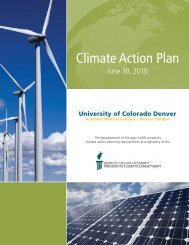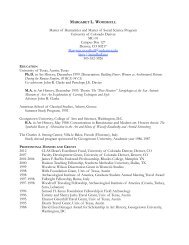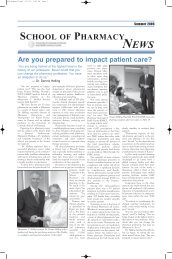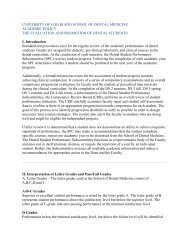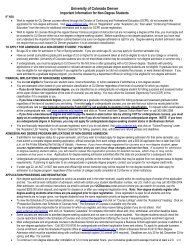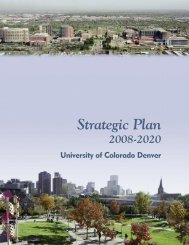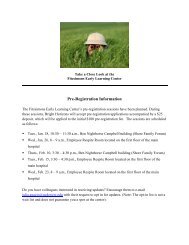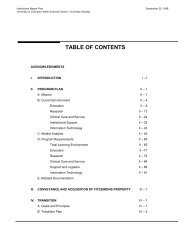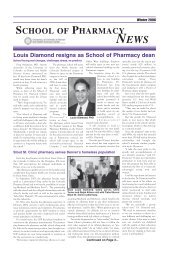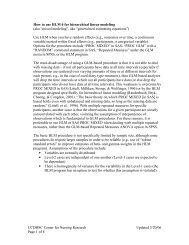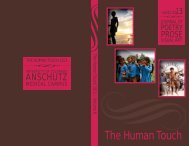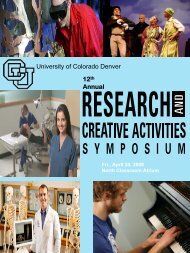Transformation - University of Colorado Denver
Transformation - University of Colorado Denver
Transformation - University of Colorado Denver
Create successful ePaper yourself
Turn your PDF publications into a flip-book with our unique Google optimized e-Paper software.
UNIVERSITY OF COLORADO AT DENVER<br />
AND HEALTH SCIENCES CENTER<br />
EDition Fall 2007<br />
<strong>Transformation</strong>
Programs<br />
As the largest graduate education program in<br />
the state, the School <strong>of</strong> Education and Human<br />
Development is making a significant impact<br />
on the policy and practice <strong>of</strong> education in<br />
<strong>Colorado</strong>. With its solid academic reputation,<br />
award-winning faculty and renowned<br />
researchers, the school contributes to making the<br />
<strong>University</strong> <strong>of</strong> <strong>Colorado</strong> at <strong>Denver</strong> and Health<br />
Sciences Center a premier research institution.<br />
— M. Roy Wilson, Chancellor<br />
2007–2008<br />
Programs:<br />
Initial licensure programs<br />
Elementary Education<br />
Secondary Education (all core subjects)<br />
K-12 Special Education<br />
Early Childhood Special Education<br />
Graduate degree programs<br />
Administrative Leadership and Policy Studies<br />
Counseling Psychology and Counselor Education<br />
Curriculum and Instruction<br />
• English Education<br />
• Linguistically Diverse Education<br />
• Literacy, Language and Culturally Responsive Teaching<br />
• Math and Science<br />
Early Childhood Education<br />
Educational Leadership and Innovation<br />
Educational Psychology<br />
Information and Learning Technologies<br />
• Information and Learning Technologies<br />
• School Library and Instructional Leadership<br />
School Psychology<br />
Special Education<br />
Dean’s Message<br />
Dear School <strong>of</strong> Education and<br />
Human Development alumni and friends,<br />
Our university is undergoing a transformation that<br />
is unprecedented in the history <strong>of</strong> the <strong>University</strong> <strong>of</strong><br />
<strong>Colorado</strong>. With the consolidation <strong>of</strong> CU’s two <strong>Denver</strong><br />
metro area campuses, we now <strong>of</strong>fer a comprehensive<br />
set <strong>of</strong> graduate programs in education, architecture,<br />
engineering, public affairs, business, the arts, medicine,<br />
nursing, pharmacy, and dentistry. New energies and new<br />
opportunities to serve our students and communities are<br />
continually emerging, both within the individual schools<br />
as well as through collaborative initiatives.<br />
The School <strong>of</strong> Education and Human Development has<br />
been actively involved in this transition as a facilitator<br />
and leader. As a faculty that has been immersed<br />
historically in P-12 education and mental health issues,<br />
we are keenly aware <strong>of</strong> the change process and <strong>of</strong> how to<br />
effectively respond. We have embraced the university’s<br />
transition to engage in our own reflection on change and<br />
to intentionally direct its purpose for the benefit <strong>of</strong> our<br />
graduates, pr<strong>of</strong>essional partners and fellow researchers.<br />
In these pages, you’ll read about the transformative<br />
powers <strong>of</strong> education in the lives <strong>of</strong> individual university<br />
students, in the progress <strong>of</strong> public school children<br />
throughout <strong>Colorado</strong>, in the positive changes throughout<br />
communities and in the effects <strong>of</strong> renewed research<br />
and policy. A number <strong>of</strong> P-12 and mental health issues<br />
addressed by our faculty and alumni are explored<br />
in these pages. Three articles focus on educational<br />
transformations for children—pr<strong>of</strong>essional development<br />
schools and principals working to significantly increase<br />
student achievement, a center that is helping students<br />
become more engaged and responsible learners through<br />
assessment, and the work <strong>of</strong> an alumnus who helps<br />
students in a youth correction facility change their life<br />
directions. Two focus on transformations for educators—<br />
the work that our education and liberal arts faculty are<br />
doing collaboratively with the support <strong>of</strong> a National<br />
Science Foundation grant to increase teachers’ knowledge<br />
in math and science as well as the establishment <strong>of</strong> the<br />
national Literacy Coaching Clearinghouse by one <strong>of</strong> our<br />
faculty. We also highlight the work <strong>of</strong> our counseling<br />
clinic, which has transformed the lives <strong>of</strong> so many <strong>of</strong> its<br />
clients, both on campus and in the community, as well as<br />
the contributions <strong>of</strong> two <strong>of</strong> our alumni—one <strong>of</strong> our state<br />
legislators and a former first lady <strong>of</strong> <strong>Colorado</strong>.<br />
Enjoy reading about the contributions<br />
that all these people and our students<br />
make. And please welcome our<br />
enthusiastic new faculty members<br />
as they join us in transforming the<br />
worlds <strong>of</strong> P-12 education and<br />
mental health.<br />
Sincerely,<br />
Lynn K. Rhodes, Dean<br />
Lynn K. Rhodes<br />
Dean, School <strong>of</strong> Education<br />
and Human Development<br />
EDition • 1
Partner School Pride<br />
Principal Awards<br />
Partnerships<br />
Whitney Rust doesn’t just spend her time studying—for 100 <strong>of</strong> 180 days <strong>of</strong> the school year,<br />
she is actively engaged in classroom teaching. Rust is a teacher candidate enrolled in the<br />
<strong>University</strong> <strong>of</strong> <strong>Colorado</strong> at <strong>Denver</strong> and Health Sciences Center’s Initial Pr<strong>of</strong>essional Teacher<br />
Education (IPTE) Program in the School <strong>of</strong> Education and Human Development.<br />
Approximately 400 teacher candidates each year are placed into 27 schools in seven<br />
<strong>Denver</strong>-area districts through the School <strong>of</strong> Ed’s partner schools program. The partner<br />
model does away with the old idea that you can throw theory at a teacher-in-training for<br />
two years, put him or her in a public school as a student teacher for a few weeks, and then…<br />
voila! Ready-Teacher! Instead, the program integrates theory and practice to train teacher<br />
candidates as it simultaneously renews the schools.<br />
Lynn K. Rhodes, dean <strong>of</strong> the School <strong>of</strong> Ed, launched the partner schools program in 1994<br />
when she was associate dean <strong>of</strong> teacher education. New research and her own observations<br />
led her to believe there was a better way to train teachers.<br />
“Our partner schools program is based on John Goodlad’s research into education<br />
renewal,” says Rhodes. “But we were also looking at our own teacher candidates<br />
and realized that we didn’t want to isolate one or two candidates in a school any<br />
more.” To remedy this, Rhodes proposed the partner schools program to an initial<br />
group <strong>of</strong> seven <strong>Denver</strong>-area schools.<br />
Partner schools are an education renewal incubator—a place where everyone<br />
agrees to a culture <strong>of</strong> pr<strong>of</strong>essional development and receives tremendous<br />
support from the university. “By infusing a school with enthusiastic and<br />
knowledgeable teacher candidates, we introduce new ideas and practices<br />
into the partner schools,” says IPTE program director Cindy Gutierrez.<br />
Typically, 10–15 teacher candidates are assigned to each partner<br />
school. The School <strong>of</strong> Ed commits a full-time faculty member<br />
to spend one day a week on-site to help candidates apply<br />
educational theories and strategies directly into their classrooms.<br />
The individual schools also commit a veteran teacher as a site<br />
coordinator. This is a huge infusion <strong>of</strong> knowledge and people. It<br />
requires a principal who values and can simultaneously manage the<br />
additional resources.<br />
One <strong>of</strong> those principals is Lynn Heintzman <strong>of</strong> Alsup Elementary<br />
School in Adams 14 Public Schools, located in Commerce<br />
City, north <strong>of</strong> <strong>Denver</strong>. The school serves a diverse population <strong>of</strong><br />
families with significant economic needs and has been a partner<br />
school since 1994. In the four years since Heintzman took the<br />
helm, Alsup has improved its academic scores, moving from a<br />
“low” ranking to a recent “average with significant improvement.”<br />
In June, Heintzman received the Wright Way Award from the<br />
<strong>Colorado</strong> Principals’ Center, and Alsup was also named one<br />
<strong>of</strong> five High-Flying Schools in the country during this year’s<br />
National Youth-At-Risk conference.<br />
Heintzman says that the partner schools program “absolutely”<br />
helped her to improve the achievement <strong>of</strong> Alsup’s students.<br />
According to Heintzman, when teacher candidates enter the<br />
school with up-to-the-minute research and training and take<br />
risks, it has an impact on the school’s culture.<br />
“We have elevated the pr<strong>of</strong>essional conversations that occur,”<br />
Heintzman says. “Not a day goes by when there isn’t an ‘Ah-Ha!’<br />
moment in each nook and cranny <strong>of</strong> the building. Daily, teachers<br />
stretch further to reach the needs <strong>of</strong> every child in this school.”<br />
Because the partner schools program has the potential to elevate<br />
teaching throughout a school, Rhodes says they purposely partner<br />
with schools that serve high-need students. “If you can learn to<br />
teach students who struggle the most with learning, then you<br />
can teach anywhere,” she says.<br />
Dean Stecklein, principal at Aurora Central High School in<br />
Aurora Public Schools east <strong>of</strong> <strong>Denver</strong>, claims to have the perfect<br />
challenge for future teachers. He became principal four years<br />
ago. “At that time, the school didn’t have much farther to go to<br />
hit rock bottom. When I took this job, I felt that if I had any<br />
skills at all, the only way we could go was up,” Stecklein jokes.<br />
He welcomed the partner school program in January 2006.<br />
Stecklein definitely has the necessary abilities. He was recently<br />
named the <strong>Colorado</strong> High School Principal <strong>of</strong> the Year by the<br />
<strong>Colorado</strong> Association <strong>of</strong> School Executives. His students’ ACT<br />
scores have improved every year and there is a renewed<br />
sense <strong>of</strong> school pride. The new teachers, he says, will<br />
walk into their first job with a much richer background<br />
than those from a traditional training program.<br />
According to many people within the partner schools,<br />
the teacher candidates are hot hiring prospects; districts<br />
have even become savvy at hoarding them. Samara<br />
Williams, an Alsup Elementary site coordinator<br />
and program graduate, considers the program<br />
a year-long interview for assessing a future<br />
teacher’s strengths and weaknesses.<br />
Principal Heintzman agrees, noting that<br />
she’s hired 12 teacher candidates in the<br />
last four years. “When I hire a teacher from<br />
the partner program, it’s like I’m getting a<br />
second-year teacher,” says Heintzman.<br />
Heintzman observes that the richness <strong>of</strong> the<br />
partner schools program reveals itself when<br />
a school continues to use the resources left<br />
by the teacher candidates who have passed<br />
through its halls. “Past interns have left toys or<br />
sculptures as thank you gifts at the end <strong>of</strong> their<br />
program,” says Heintzman. “Now they also<br />
leave full-blown curricula. The legacy <strong>of</strong> their<br />
impact lives on, year after year.”<br />
EDition • 2<br />
Lynn Heintzman<br />
Principal <strong>of</strong> Alsup<br />
Elementary School<br />
Dean Stecklein<br />
Principal <strong>of</strong> Aurora<br />
Central High School<br />
EDition • 3<br />
Based on Winslow Homer’s painting, “Snap<br />
the Whip”, the Alsup school courtyard<br />
sculpture is a School <strong>of</strong> Ed legacy project.
Marlinda Hines (right)<br />
Graduate student/intern<br />
in the counseling program<br />
Families<br />
Faculty<br />
Through the Looking Glass<br />
Reflecting Harmony in Families<br />
Six Diverse Perspectives<br />
New Faculty Arrivals at the School <strong>of</strong> Ed<br />
Polishing the mirror <strong>of</strong> self-perception is a task<br />
that requires patience, care and understanding—<br />
especially when that image reflects an entire<br />
family. Through a partnership with the<br />
university’s Student and Community Counseling<br />
Center, graduate students in the counseling<br />
program at the School <strong>of</strong> Education and Human<br />
Development have unique opportunities to help<br />
families communicate better.<br />
Every session is conducted with two counseling<br />
graduate students and a supervisor who is “behind<br />
the glass.” Two-way mirrors, headphones, audio<br />
and video recording allow supervisors to advise<br />
live, a rarity among counseling clinics. The<br />
practicum lasts a full semester and requires 150<br />
hours <strong>of</strong> training, though, as Hines observes,<br />
“Most students like to take advantage <strong>of</strong> the<br />
program and facilities and average 250 hours.”<br />
In its ever-expanding role as a leader in education and human development, the School <strong>of</strong> Ed opens its doors to welcome six<br />
dynamic new faculty members.<br />
Manuel Espinoza grew up in <strong>Denver</strong> and has returned home to become an assistant pr<strong>of</strong>essor in the<br />
Literacy, Language and Culturally Responsive Teaching program. Espinoza earned his PhD in education<br />
in spring 2007 from <strong>University</strong> <strong>of</strong> California at Los Angeles. He has a major interest in undergraduate<br />
teacher education and in migrant education. Building on work he had done at UCLA, he began a<br />
Young Migrant Scholars program over the summer on campus.<br />
Special phone allows<br />
supervisor to advise live<br />
from “behind the glass.”<br />
EDition • 4<br />
“Many people are surprised to learn that our<br />
team <strong>of</strong> graduate students and supervisors <strong>of</strong>fer<br />
10 free counseling sessions for all families within<br />
the <strong>Denver</strong> Public Schools,“ says Pat Larsen, the<br />
center’s director. “Our graduate students are front<br />
line ambassadors who really enter the hearts and<br />
minds <strong>of</strong> the <strong>Denver</strong> Public School families.”<br />
Practicums and internships for the master’s degree<br />
in counseling psychology and counselor education<br />
provide students with experience in addressing<br />
a wide variety <strong>of</strong> issues ranging from divorce<br />
to behavioral problems. Because the master’s<br />
program and the funded center are integrated<br />
within the university, there is more freedom in<br />
servicing the client.<br />
“Often, institutions are problem-focused, and<br />
clients may view us as just another negative part <strong>of</strong><br />
the system,” says Amy Bergan, an intern on track<br />
to work for mental health/counseling agencies.<br />
“We create an atmosphere <strong>of</strong> openness and fun,<br />
allowing clients to put down their shields.”<br />
In cases <strong>of</strong> divorce, intern Marlinda Hines<br />
says, “Our goal is to improve the adult clients’<br />
cooperative co-parenting skills. They can learn<br />
to agree on how to discipline their child and<br />
establish routines such as bedtime, regardless <strong>of</strong><br />
which home the child is in.”<br />
“The staff is very thoughtful, friendly<br />
and supportive. This has definitely<br />
helped my granddaughter with more<br />
effective ways to express herself.”<br />
“What we know about successful communication<br />
is that when clients have a novel counseling<br />
experience or dramatic intervention, the results<br />
are powerfully transformative,” states Larsen.<br />
Ruth Possehl, a supervisor and psychotherapist at<br />
the center, is one <strong>of</strong> the experts leading student<br />
counselors in a technique referred to as “reflecting<br />
teams.” Ruth and her students literally change<br />
places with a family in session, allowing parents,<br />
grandparents and kids to sit and watch from<br />
inside the observation room. Team members play<br />
the role <strong>of</strong> family members and reflect upon what<br />
it must feel like as they enact a situation and<br />
demonstrate how to better communicate.<br />
With the pr<strong>of</strong>essional care provided by the<br />
university’s center team, families are able to look<br />
beyond the surface chaos <strong>of</strong> everyday life and<br />
make an important rediscovery. They are able to<br />
recognize and remember the deep connections<br />
and love they share.<br />
Carlos Porfirio Hipolito-Delgado is an assistant pr<strong>of</strong>essor in the Counseling Psychology and<br />
Counselor Education program with a focus on school counseling. Hipolito-Delgado earned his PhD in<br />
counselor education from the <strong>University</strong> <strong>of</strong> Maryland in spring 2007. His previous education included<br />
a master’s in counseling in student services and a bachelor’s in mathematics from UCLA.<br />
Jody Polleck, an assistant pr<strong>of</strong>essor in the Literacy, Language and Culturally Responsive Teaching<br />
program, comes from New York City, where she was a full-time lecturer for Hunter College and<br />
part-time literacy coach for a local high school. Pollack earned her PhD in English education from New<br />
York <strong>University</strong> in spring 2007 and assumes a leadership role for English education at UCDHSC.<br />
Maria Ruiz-Primo is an associate pr<strong>of</strong>essor in research methodology and the new director <strong>of</strong> the<br />
Research Center, a School <strong>of</strong> Ed center that supports faculty research. Ruiz-Primo has spent most <strong>of</strong><br />
her career as a senior research associate and scholar at Stanford <strong>University</strong>, where she was co-director <strong>of</strong><br />
the Stanford Education Assessment Laboratory. Ruiz-Primo earned her PhD in educational psychology<br />
from the <strong>University</strong> <strong>of</strong> California at Santa Barbara in 1994.<br />
Laura Summers, an assistant pr<strong>of</strong>essor, has assumed a leadership role for the School Library and<br />
Instructional Leadership program. Summers arrived at UCDHSC from the <strong>University</strong> <strong>of</strong> Northern<br />
<strong>Colorado</strong>, where she earned her PhD in education instructional design in 2003 and then served as the<br />
school library program coordinator. Summers has 13 years <strong>of</strong> experience as a secondary school librarian,<br />
teacher and induction coach.<br />
Bryan Wee, an assistant pr<strong>of</strong>essor, joins the math and science faculty in the School <strong>of</strong> Education and<br />
Human Development with a partial appointment in geography and environmental sciences in the<br />
College <strong>of</strong> Liberal Arts and Sciences. Wee comes from Purdue <strong>University</strong>, where he was a teaching<br />
assistant in curriculum and instruction as well as in earth and atmospheric sciences. He earned his PhD<br />
at Purdue in spring 2007 in science education.<br />
EDition • 5
Children K–12<br />
School Children<br />
Julie O’Brian<br />
Director, <strong>Colorado</strong><br />
Consortium for<br />
Data-Driven Decisions<br />
EDition • 6<br />
Shifting the Learning Paradigm<br />
Innovations in Classroom Assessment<br />
Redefine the purpose <strong>of</strong> classroom assessment,<br />
and students redefine—and improve—their own<br />
learning process.<br />
For four years, the School <strong>of</strong> Education and<br />
Human Development has taken a leading role in<br />
creating and implementing innovative assessment<br />
models that go well beyond the state’s mandated<br />
assessments. Two university-related projects,<br />
Preparing Tomorrow’s Teachers for Data-Driven<br />
Decisions (pre-service) and the <strong>Colorado</strong><br />
Consortium for Data-Driven Decisions (C2D3,<br />
in-service) have yielded impressive results.<br />
According to recent <strong>Colorado</strong> school district<br />
studies conducted by the Northwestern Evaluation<br />
Association, the average annual learning point<br />
increase for a student to reach the next grade level<br />
ranges from three to five points. Students who have<br />
been through the C2D3 program show an increase<br />
<strong>of</strong> more than 20 points in the same time period.<br />
Director <strong>of</strong> both projects, Julie O’Brian says,<br />
“The power is in the total shift from teacher-focus<br />
to student-as-learner process. This program<br />
transforms our vision <strong>of</strong> what learning is about<br />
through the lens <strong>of</strong> assessment.”<br />
What, exactly, is the essential difference between<br />
the C2D3 approach and traditional assessment?<br />
Metacognition. It’s a complex word for a simple<br />
underlying idea: learning clarity. This quality allows<br />
an individual to step back and witness oneself as<br />
a learner, to recognize what one knows, what one<br />
doesn’t know and what needs to be changed. Using<br />
techniques and practices from the C2D3 program,<br />
students and teachers discover how to expand their<br />
metacognitive abilities. The skills are applicable to<br />
every facet <strong>of</strong> learning. And the good news is that<br />
metacognition is teachable.<br />
Until now, conventional classroom assessment<br />
such as the state achievement test has been<br />
outcome-focused. C2D3 works on a different<br />
perception. Clusters <strong>of</strong> questions tell teachers<br />
not only whether a student is grasping concepts,<br />
but also how one gathers information. It informs<br />
teachers what they can do instructionally for each<br />
child and for groups <strong>of</strong> learners.<br />
The exciting difference about C2D3 is that this<br />
system puts learning back into the hands <strong>of</strong><br />
students—starting as early as kindergarten.<br />
In-depth engagement allows children to selfmonitor<br />
their own processes, as well as work<br />
collaboratively through peer assessment.<br />
“I see that I got the stem and leaf problem wrong<br />
because I rushed and skipped step four,” calls out<br />
teacher Jill Rodgers to her classroom <strong>of</strong> 5th and<br />
6th graders at a school in Adams County. Voicing<br />
the discovery <strong>of</strong> one <strong>of</strong> the students, she’s using this<br />
observation as a query for others to investigate their<br />
own experience. Hands shoot up, children agree or<br />
voice how they approach learning differently and<br />
what mistakes they are making. Rodgers responds<br />
with a hearty, “That is very fixable.” The procedure<br />
objectifies “right” and “wrong” into information<br />
gathering, sharing and finding solutions.<br />
O’Brian’s passion for educational initiatives<br />
began when she worked for <strong>Colorado</strong>’s Governor<br />
Roy Romer in the 1980s and 1990s. She<br />
enthusiastically notes, “All kids can learn. Now<br />
we can tell them: Here’s how!” C2D3 classroom<br />
assessment polishes the keys to learning—goalsetting,<br />
targeting, support questioning, progress<br />
monitoring—and turns them over to students.<br />
“Bad” marks are no longer bad because testing<br />
becomes an active part <strong>of</strong> teaching oneself to learn<br />
at the most fundamental levels.<br />
Literacy Coaches Create Winning Teachers<br />
Literacy coaching is new territory that’s well Nancy Shanklin, a literacy pr<strong>of</strong>essor in the<br />
worth exploring.<br />
School <strong>of</strong> Education and Human Development<br />
and the inaugural director <strong>of</strong> LCC, is<br />
This opinion is shared by both the International enthusiastic about the immediate and long-range<br />
Reading Association (IRA) and the National benefits <strong>of</strong> literacy coaching. “Response to our<br />
Council <strong>of</strong> Teachers <strong>of</strong> English (NCTE), who national web site, launched in October 2006,<br />
funded the establishment <strong>of</strong> an organization shows the interest as well as the potential for this<br />
dedicated to increase the knowledge base, field. Our site serves teachers, administrators and<br />
research and practice <strong>of</strong> literacy coaching. policy-makers as an ongoing, interactive resource<br />
The organization, the Literacy Coaching<br />
rich in information about literacy coaching.”<br />
Clearinghouse, actively works with coaches<br />
to lead pr<strong>of</strong>essional development initiatives Literacy coaching is progressive, and it is<br />
for schools and districts in grades P-12. Both also a part <strong>of</strong> <strong>Colorado</strong>’s history. The general<br />
the IRA and NCTE understand that literacy educational coaching field has strong roots<br />
coaching is an important component to the throughout the state, leading national efforts<br />
success <strong>of</strong> No Child Left Behind including along with New York and Massachusetts.<br />
Reading First and Striving Readers.<br />
Coaching has the advantage <strong>of</strong> being adaptable<br />
to the specific needs <strong>of</strong> a particular school or<br />
The role <strong>of</strong> a coach is different than that <strong>of</strong> a district. The Literacy Coaching Clearinghouse<br />
reading specialist. A specialist is hired primarily is also a way to confront teacher retention,<br />
to <strong>of</strong>fer direct services to groups <strong>of</strong> students as especially in urban areas. Going forward into<br />
well as provide pr<strong>of</strong>essional development for 2008, the Clearinghouse is developing selfassessments<br />
for coaches at all levels and plans to<br />
teachers. A literacy coach does limited direct<br />
work with students and instead focuses the create online pr<strong>of</strong>essional development pathways<br />
majority <strong>of</strong> energies on supporting teachers. As and to network with pr<strong>of</strong>essional associations in<br />
a fitness trainer benefits a top athlete, a trained other content areas, such as math and science.<br />
literacy coach acts on the classroom teacher’s<br />
behalf as a trusted colleague who helps achieve Major characteristics <strong>of</strong> effective literacy include<br />
chosen goals effectively. Literacy coaches work collaborative dialogue for teachers and facilitation<br />
side-by-side with teachers—through modeling <strong>of</strong> a school or district’s vision about literacy that<br />
lessons in the classroom or observation and is site-based and connected to overall district<br />
discussion. Literacy coaches do not conduct goals. In discussions <strong>of</strong> what’s necessary to<br />
evaluation on teachers or policies; they help become a good literacy coach, the quality <strong>of</strong><br />
teachers implement quality instruction. Their “resiliency” ranks high. As a newly emerging<br />
presence in a school or district passes the latest specialty, the role <strong>of</strong> literacy coach is one that is<br />
information on literacy teaching directly into designed for just that, ready to adapt to the<br />
the hands <strong>of</strong> teachers, who can then more educational needs <strong>of</strong> a rapidly changing society.<br />
readily help students.<br />
For more information, visit the website at:<br />
www.literacycoachingonline.org.<br />
NANCY SHANKLIN<br />
Director, Literacy<br />
Coaching Clearinghouse<br />
EDition • 7
<strong>Transformation</strong><br />
Four follow-up Saturday sessions during the academic<br />
“I now have a realistic<br />
perspective about what<br />
K-12 students can do…<br />
I learned a number <strong>of</strong><br />
teaching strategies<br />
that I use because my<br />
partner confirmed that<br />
they can actually work.<br />
I also learned how<br />
to clarify and<br />
connect things.”<br />
— College <strong>of</strong> Liberal Arts and<br />
Science faculty member<br />
National Grant Improves Middle School<br />
Teaching, Learning in Math, Science<br />
From U.S. Secretary <strong>of</strong> Education Margaret Spellings to the local press, the message is<br />
getting out: this country needs to improve student performance in math and science to be<br />
competitive in a global marketplace. Here’s the rub: how exactly can one achieve that goal?<br />
Faculty at the university are exploring ways to improve teaching and learning in science<br />
and math at the middle school level through a five-year federal grant. Now in its third year,<br />
the program is beginning to yield success stories and genuine excitement.<br />
The Rocky Mountain Middle School Math and Science Partnership (RM-MSMSP) is<br />
a National Science Foundation-funded project that targets middle school teachers and<br />
students. The project links seven <strong>Denver</strong> metro school districts with faculty from<br />
<strong>University</strong> <strong>of</strong> <strong>Colorado</strong> at <strong>Denver</strong> and Health Sciences Center and four other university<br />
partners. The primary goal <strong>of</strong> the project is to increase the number <strong>of</strong> highly<br />
qualified and high quality middle school teachers in math and science<br />
and provide opportunities for middle school students to learn more<br />
about math and science through after-school initiatives and specially<br />
designed summer camps.<br />
The partnership is focused on strategies<br />
to improve math and science<br />
learning with an ultimate<br />
outcome <strong>of</strong> creating an<br />
innovative and productive<br />
work force that is competitive<br />
in the world marketplace.<br />
Guiding this complex<br />
undertaking are Doris<br />
Kimbrough (College <strong>of</strong> Liberal<br />
Arts and Sciences, chemistry) and<br />
year augment the summer institutes and provide a<br />
focus on instructional practice in the classroom with<br />
an aim for added improvement.<br />
All courses are co-taught by a representative <strong>of</strong> the<br />
College <strong>of</strong> Liberal Arts and Sciences, the School<br />
<strong>of</strong> Education and Human Development and K-12<br />
school districts. Courses use reform-based teaching<br />
practices and problem-based models so that teachers<br />
can understand the content from both a theoretical<br />
and practical point <strong>of</strong> view.<br />
Of special note is the specific focus on the challenge<br />
facing teachers in classrooms to make abstract math and<br />
science concepts understood by the high percentage <strong>of</strong><br />
English language learners who attend <strong>Colorado</strong> schools.<br />
Many young people are learning English at the same<br />
time they are learning academic concepts. They may be<br />
conversant in casual exchange, but gaining facility in<br />
the world <strong>of</strong> academic vocabulary is an added challenge.<br />
Instructors and teacher participants in<br />
the RM-MSMSP courses are<br />
learning sheltered English<br />
instruction strategies that<br />
specifically focus on<br />
these issues.<br />
In a number <strong>of</strong> cases, 10–15<br />
teachers have participated<br />
from one school. One case<br />
is Everitt Middle School<br />
in Jefferson County<br />
Public Schools, west<br />
<strong>of</strong> <strong>Denver</strong>. This<br />
school is in an area<br />
where younger families <strong>of</strong> more diverse ethnicities,<br />
language and socio-economic backgrounds are taking<br />
the place <strong>of</strong> older, more homogeneous families.<br />
Student progress in mathematics has been variable.<br />
To improve the situation, 14 members <strong>of</strong> the Everitt<br />
School staff, including the principal, special education<br />
teacher and librarian, participated in RM-MSMSP<br />
sponsored courses.<br />
“My impression <strong>of</strong> college<br />
pr<strong>of</strong>essors has been blown out<br />
<strong>of</strong> the water…I was impressed<br />
by the compassion <strong>of</strong> my two<br />
co-instructors, and I’ve learned<br />
soooo much.”<br />
— K-12 School District faculty member<br />
The principal observed that all teachers were feeling<br />
more capable and comfortable in assisting students, and<br />
their efforts became a topic <strong>of</strong> conversation among the<br />
student population. “Because several <strong>of</strong> us are taking<br />
the courses together, students are intrigued by the<br />
fact that the adults in our school are taking a class ‘for<br />
fun’ and doing homework,” noted one educator. “The<br />
modeling <strong>of</strong> life-long learning has made an impression<br />
on the relationship <strong>of</strong> being an adult and learning.”<br />
Doris Kimbrough & Carole Basile<br />
Carole Basile (School <strong>of</strong> Education and<br />
Human Development, teacher education).<br />
The RM-MSMSP strategy toward achieving the<br />
goal for teachers is a multi-pronged approach that<br />
EDition • 8<br />
begins with 17 two- or three-week content-focused<br />
summer institutes that include topics in the following<br />
general math and science areas: biology, geology, physics,<br />
chemistry, algebra, calculus, geometry, discrete math, math<br />
modeling, probability and statistics, and history <strong>of</strong> math.<br />
Did you know...<br />
Impact from the RM-MSMSP grant work has resulted in<br />
three new Title II grants being awarded to three districts and<br />
the university by the <strong>Colorado</strong> Department <strong>of</strong> Education.<br />
Approximately $1.4 million goes to the three projects over the<br />
next three years to expand the work begun in the RM-MSMSP.<br />
For more information, visit http://rmmsmsp.cudenver.edu.<br />
EDition • 9<br />
Doris Kimbrough<br />
Associate pr<strong>of</strong>essor, College<br />
<strong>of</strong> liberal arts and sciences<br />
Carole Basile<br />
Associate pr<strong>of</strong>essor, School <strong>of</strong><br />
Education and human development
EDition • 10<br />
From the middle school student end, think fun. One-week<br />
sessions for non-residential campers are sponsored by<br />
RM-MSMSP in collaboration with the university’s<br />
pre-collegiate programs and by neighboring Metropolitan<br />
State College <strong>of</strong> <strong>Denver</strong>. Activities include exploration <strong>of</strong><br />
the planet’s atmospheric conditions, engineering through<br />
the design <strong>of</strong> robots, crime scene investigation and forensic<br />
data studies, and global positioning systems mapping <strong>of</strong><br />
the earth. One-week residential programs are also <strong>of</strong>fered<br />
at Fort Lewis College in Durango and <strong>Colorado</strong> State<br />
<strong>University</strong> in Ft. Collins.<br />
Topics presented in the CSU<br />
camp included physics, mechanical<br />
engineering, water resources, light<br />
and optics and biotechnology.<br />
Field trips to the CHILL radar<br />
station were rated by campers as<br />
near “excellent.” The 2006 Fort<br />
Lewis summer camp sessions were<br />
uniquely structured to provide<br />
in-depth coverage <strong>of</strong> a student’s<br />
chosen topic: agroecology,<br />
astronomy or water quality. Students<br />
could focus on new information<br />
each day within their chosen area;<br />
they can also study the same subject<br />
or another in consecutive years.<br />
In a follow-up survey, the RM-MSMSP- supported<br />
summer camps received consistently high rankings from<br />
participants, instructors and counselors, and students<br />
“Even after all these years,<br />
I learned a few math<br />
topics that were new to<br />
me like using graph theory<br />
to explore puzzles. In my<br />
courses, I keep teaching<br />
less…I keep seeing the<br />
wisdom <strong>of</strong> employing<br />
‘less is more.’”<br />
— School <strong>of</strong> Education and Human<br />
Development faculty member<br />
reported higher interest levels in<br />
math and science. Most parents report<br />
they would recommend the camps to others and<br />
would send their children again.<br />
“The effects <strong>of</strong> this NSF grant will be far-reaching,” says<br />
Basile. “The middle school years are crucial to a student’s<br />
success. It’s critical to capture kids’<br />
interest about math and science<br />
during these years if we expect<br />
them to think about preparing for<br />
college, a possible career in math<br />
and science, or being good citizens<br />
who understand how knowledge in<br />
math and science helps them solve<br />
problems and make decisions for<br />
the next century. We are fortunate<br />
to have a grant that allows us to<br />
provide students with access to<br />
quality teachers, extra-curricular<br />
programs, challenging courses,<br />
and environments that promote<br />
math and science education. The<br />
challenge, as with everything, will<br />
be sustainability and institutionalization. We hope that with<br />
a new and growing interest in math and science education,<br />
we can build on past history in this area and continue to<br />
have an impact on student learning.”<br />
Teachers take a hands-on approach to learn and teach science and math.<br />
Symposium<br />
Conversations About Race and Equity<br />
Doctoral Students <strong>of</strong> Color Create Discussion Platform<br />
Four years ago, a handful <strong>of</strong> Educational<br />
Leadership and Innovation students joined forces<br />
to form Doctoral Students <strong>of</strong> Color (DSOC),<br />
a group interested in engaging “the School<br />
<strong>of</strong> Education and Human Development in<br />
conversations about race and equity.”<br />
Since then, the organization has hosted welcome<br />
receptions for new PhD candidates, sponsored<br />
book study groups and mounted annual<br />
symposia featuring eminent scholars.<br />
For its annual symposium this March, the<br />
group, in collaboration with faculty from the<br />
Educational Leadership and Innovation program,<br />
invited Jean Anyon, the groundbreaking author<br />
<strong>of</strong> Radical Possibilities: Public Policy, Urban<br />
Education, and a New Social Movement, for<br />
a series <strong>of</strong> talks and meetings. Discussions<br />
revolved around the book’s central premise:<br />
that public policies governing minimum wage,<br />
transportation access, jobs and affordable<br />
housing trump educational policy when it comes<br />
to perpetuating poverty and other issues afflicting<br />
urban and low-income schools.<br />
To prepare for Anyon’s visit, students and School<br />
<strong>of</strong> Ed faculty read and discussed her book. “The<br />
most interesting thing to come out <strong>of</strong> this,” says<br />
Shelley Zion, one <strong>of</strong> the founders <strong>of</strong> DSOC<br />
instrumental in bringing Anyon to campus,<br />
“was how those who participated (in the book<br />
discussion) began to think: does the School <strong>of</strong><br />
Education have a responsibility or a right to push<br />
for social change?”<br />
During her appearance, Anyon gave an evening<br />
presentation, which drew more than 100<br />
attendees from the community and across<br />
departments. Next day, she met separately with<br />
doctoral students, faculty and deans to explore<br />
how they might foment the kind <strong>of</strong> beyondthe-classroom<br />
social and public policy changes<br />
articulated in Radical Possibilities.<br />
“Internally, the conversation has been about<br />
making sure that equity in education is<br />
something that is included in course work,” Zion<br />
explains. “Now, we are looking at learning more<br />
about the factors outside <strong>of</strong> school.”<br />
According to Deanna Sands, associate dean<br />
<strong>of</strong> research and leadership, DSOC, which<br />
was founded by PhD students Zion, Omar<br />
Montgomery, Elyse Yamauchi and Khushnur<br />
Dadabhoy, has helped transform the school’s<br />
awareness <strong>of</strong> how to foster and embrace diversity<br />
more fully. “Feedback from this group, in part,<br />
has served as a catalyst for faculty in the school<br />
to understand that we had issues regarding<br />
recruitment and retention <strong>of</strong> faculty and students<br />
<strong>of</strong> color as well as issues with supporting a<br />
culture in which diversity is valued.”<br />
“The School <strong>of</strong> Education and Human<br />
Development has made a commitment to work<br />
on issues <strong>of</strong> equity and diversity,” Zion adds.<br />
EDition • 11
Judy solano<br />
Chairperson <strong>of</strong> education committee in<br />
colorado house <strong>of</strong> representatives<br />
Research<br />
Policy<br />
Natasha watson<br />
Outstanding Graduate<br />
Award, Educational<br />
Leadership and<br />
Innovation program<br />
Venita doughty<br />
Outstanding Graduate<br />
Award, Educational<br />
Leadership and<br />
Innovation program<br />
EDition • 12<br />
Changing Classroom Culture<br />
From Immigration to Technology Issues: Two Dissertations<br />
Dissertations by two newly-minted PhDs could<br />
transform classroom culture for immigrants from<br />
the former USSR and teachers seeking to deepen<br />
kids’ computer skills.<br />
Natasha Watson and Venita Doughty are the most<br />
recent recipients <strong>of</strong> the Outstanding Graduate<br />
Award from the School <strong>of</strong> Ed’s Educational<br />
Leadership and Innovation program for their<br />
ethnographic studies, contributing to the greater<br />
discussion about educational equity and access in<br />
the United States.<br />
In Watson’s case, she spent a year-and-a-half<br />
studying 36 high school students who recently<br />
relocated to <strong>Colorado</strong> from former Soviet states.<br />
Her goal: to understand their academic and<br />
social identities as young expatriates. Raised and<br />
educated in Siberia herself, Watson discovered that<br />
she held her own biases concerning immigrant<br />
students from conservative Christian backgrounds.<br />
“I transformed,” she says. “I came in with my<br />
Russian nationalist frame <strong>of</strong> mind, thinking that<br />
these religious students didn’t aspire to education.<br />
It’s a lot more complex than I thought, and more<br />
complex, too, in how school <strong>of</strong>ficials, teachers and<br />
community members regard these kids.”<br />
Watson found that in school “Russians” are<br />
lumped together, though they may have different,<br />
even fractious national or ethnic backgrounds.<br />
They are also perceived through stereotypes that<br />
involve organized crime, alcoholism and poor<br />
academic performance.<br />
Watson’s dissertation illuminates the fact that<br />
“racism and discrimination aren’t reserved for<br />
people <strong>of</strong> color,” explains Associate Pr<strong>of</strong>essor<br />
Sheila Shannon, who co-chaired Watson’s<br />
dissertation committee with faculty member<br />
Maria Thomas-Ruzic.<br />
During her research, Watson mentored four<br />
students who have become the first in their<br />
community to attend a four-year university—<br />
the <strong>University</strong> <strong>of</strong> <strong>Colorado</strong> at <strong>Denver</strong> and Health<br />
Sciences Center. “I have changed in many ways,”<br />
says Watson, who is now in the process <strong>of</strong><br />
launching a student mentoring organization for<br />
<strong>Colorado</strong> immigrants from the former Soviet Union.<br />
Venita Doughty looked at school culture through<br />
a different lens—technology. Working in an<br />
after-school program and as a classroom<br />
technology consultant in an urban elementary<br />
school for three years, Doughty made discoveries<br />
that may help debunk the myth that teachers don’t<br />
care about computers.<br />
An instructional designer by pr<strong>of</strong>ession, Doughty<br />
discovered that integrating technology more<br />
effectively into classrooms is not a matter <strong>of</strong><br />
teacher will, as many have charged, but more a<br />
problem <strong>of</strong> computer numbers, technical support,<br />
maintenance, training and teacher planning<br />
hours. To really meet teacher and student needs,<br />
Doughty also learned that educational s<strong>of</strong>tware<br />
must be extremely flexible and developed more<br />
collaboratively than it is today.<br />
“She shows on a ground level,” says Honorine<br />
Nocon, faculty chair <strong>of</strong> Doughty’s dissertation<br />
committee, “that it’s not <strong>of</strong> lack <strong>of</strong> interest on the<br />
part <strong>of</strong> teachers; it’s a lack <strong>of</strong> resources.”<br />
A Champion in the House<br />
Alumna Advocates for Better<br />
Education Policies, Techniques<br />
“To be effective as a teacher,” says Judy Solano, “you have<br />
to be flexible, constantly question the techniques you’re<br />
using and always look for new approaches. That’s the way it<br />
is as a legislator, too.”<br />
Solano is actively helping to craft those better policies in<br />
the <strong>Colorado</strong> legislature. A second-term Democrat from<br />
House District 31 in Adams County, outside <strong>of</strong> <strong>Denver</strong>,<br />
Solano chairs the House Education Committee and has<br />
authored some significant pieces <strong>of</strong> education-related<br />
legislation. After 29 years in the classroom, Solano<br />
naturally considers education a legislative focus. But her<br />
completion <strong>of</strong> a master’s degree in 1992 from the School<br />
<strong>of</strong> Education and Human Development was at least as<br />
important as her job experience in driving her policy goals.<br />
“The classes I took at the downtown <strong>Denver</strong> campus were<br />
exceptional,” she says. “I had taught for at least 15 years<br />
when I went back to get my master’s, and the program<br />
really guided me in a new direction. It made me realize<br />
that there’s not one answer when you’re teaching kids.<br />
They respond differently and you must adapt.”<br />
Accordingly, Solano has worked to loosen some <strong>of</strong> the<br />
constraints imposed upon students and teachers by the<br />
state’s mandated achievement test. “We test our kids to<br />
death in this state,” she says. “We’re one <strong>of</strong> only 12 states<br />
to go beyond what the federal government requires us to<br />
do in terms <strong>of</strong> testing our kids. I think we could use those<br />
resources in a better way and still get the information we<br />
need to move forward.”<br />
In 2007 Solano sponsored HB 1246, which authorized<br />
alternative testing options for students who face special<br />
challenges that tend to drive scores downward. The bill also<br />
eliminated certain penalties that tended to fall most heavily<br />
on schools with transient populations.<br />
Solano also champions early childhood education. In 2007<br />
she sponsored HB 1062, which establishes a statewide<br />
system <strong>of</strong> councils to help set standards and broaden access<br />
to early childhood education. Just as important, the bill<br />
created a statewide early childhood education <strong>of</strong>fice, which<br />
falls under the lieutenant governor’s purview.<br />
“We haven’t done a very good job in <strong>Colorado</strong> <strong>of</strong> providing<br />
opportunities for early childhood education,” she says. “But<br />
study after study has shown that one <strong>of</strong> the best ways to<br />
improve high-school graduation rates is to expand access<br />
to pre-school. This bill will create many more slots for kids<br />
who could definitely benefit.”<br />
Solano credits her CU education with making her a more<br />
nuanced political practitioner. “It gave me an appreciation<br />
for other people’s opinions,” she says. “Going through a<br />
graduate program makes you realize that most things are<br />
not black and white. I think I carried that attitude with<br />
me when I went up to the Capitol. I try to remain open to<br />
learning new things and new approaches.”<br />
Spoken like a true leader.<br />
EDition • 13
Rambotics team members<br />
included specially-shaped haircuts<br />
as part <strong>of</strong> their team uniform.<br />
Active Grants | 42 Grants Totaling: $29,254,267<br />
EDition • 14<br />
Robotics<br />
Changing Life Directions<br />
Academy Wins a FIRST<br />
When science and technology team up with a<br />
dedicated teacher and ingenious students, the<br />
results are transformative. They can even lead to<br />
winning a U.S. regional championship and a<br />
place <strong>of</strong> national honor in the country’s<br />
final competitions.<br />
Ridgeview Academy <strong>of</strong> Watkins, Colo., celebrated<br />
a stand-out victory for the FIRST (For Inspiration<br />
and Recognition <strong>of</strong> Science and Technology)<br />
2007 event while competing with elite academic<br />
institutions from all corners <strong>of</strong> the state. Led<br />
by Russell Birchill, who is pursing a master’s in<br />
informational and learning technologies (ILT)<br />
degree at the School <strong>of</strong> Education and Human<br />
Development, the students immersed themselves<br />
in designing and building original working robots.<br />
The Ridgeview Rambotics team applied their<br />
skills with creativity, perseverance and a<br />
requirement <strong>of</strong> the competition referred to as<br />
“gracious pr<strong>of</strong>essionalism.”<br />
Ridgeview Academy is a charter school in <strong>Denver</strong><br />
Public Schools that serves the Division <strong>of</strong> Youth<br />
Corrections. All members <strong>of</strong> the robotics team<br />
have been convicted <strong>of</strong> felony crimes within the<br />
youth system.<br />
The FIRST Robotics Championship is informally<br />
known as the “Super Bowl <strong>of</strong> Smarts.” A test<br />
<strong>of</strong> engineering ability and innovation, the<br />
multinational competition receives support<br />
from foremost inventor Dean Kamen, the<br />
creator <strong>of</strong> the Segway transportation device. The<br />
FIRST challenge reaches more than 32,500 high<br />
school students on 1,300 teams in 37 regionals<br />
throughout 15 countries.<br />
Undoubtedly the best-dressed team in the<br />
competition, the Ridgeview Academy Rambotics<br />
donned tuxedo shirts and bow ties for the grueling<br />
but exciting three-day event. As they progressed<br />
through the quarterfinals into the semi-finals, there<br />
was a clear indication that the Red Alliance partner<br />
team consisting <strong>of</strong> Ridgeview Academy, Montclair<br />
High School (New Jersey) and Arvada High<br />
School in nearby Jefferson County had a superior<br />
advantage. The winner was determined in the final<br />
round <strong>of</strong> the best-two-out-<strong>of</strong>-three championship<br />
match after a disastrous robot breakdown in the<br />
first match. Ridgeview Academy and their partners<br />
rallied to win the regional championship.<br />
Ridgeview Rambotics was honored with the<br />
Underwriters Lab Industrial Safety Award and the<br />
Johnson and Johnson Sportsmanship Award, as<br />
well as a peer award for the strongest defense.<br />
They finished a close second for the Chairman’s<br />
Award, the highest award given for representing<br />
the FIRST community by demonstrating core<br />
values and engaging community involvement<br />
to raise awareness <strong>of</strong> the power <strong>of</strong> a science and<br />
technology career.<br />
Traveling to Atlanta for the national finals,<br />
Ridgeview Academy Rambotics had a strong<br />
start, but not an ultimate first place. Despite their<br />
losses, Team 1583 and its alliance partners held<br />
the highest match score in its division. The overall<br />
ranking after two days <strong>of</strong> play was 46 out <strong>of</strong> 86,<br />
an impressive beginning for a team’s first entry.<br />
Students on the team said they would not have<br />
traded this experience for anything. It was, in<br />
the words <strong>of</strong> a team member, “the most awesome<br />
<strong>of</strong>f-site event in Ridgeview history!”<br />
Project Title and Grant Period<br />
Principal Investigator Total Amount<br />
Funding Source<br />
Adams 12 Five-Star Schools Contract<br />
Teachers (2007–2008)<br />
Gutierrez, Cindy K. $231,278<br />
Adams County School District 12<br />
Bilingual ESL Network (BEN): Training for<br />
All Teachers (2001–2007)<br />
Shannon, Sheila M. $1,029,330<br />
U.S. Department <strong>of</strong> Education<br />
Calculus-Based Introductory Physics:<br />
Maximizing Learning Effectiveness in an<br />
Online Delivery Format (2004–2007)<br />
Dunlap, Joanna C. $156,080<br />
FIPSE Comprehensive Program U.S. Department <strong>of</strong><br />
Education through <strong>Colorado</strong> School <strong>of</strong> Mines<br />
Center on Evidence-Based Practice: Young<br />
Children with Challenging Behavior (2002–2007)<br />
Smith, Barbara Jean $1,074,120<br />
U.S. Department <strong>of</strong> Education<br />
through <strong>University</strong> <strong>of</strong> South Florida<br />
Center on Personnel Preparation Policy<br />
and Practice (2006–2007)<br />
Smith, Barbara Jean $147,217<br />
U.S. Department <strong>of</strong> Education<br />
through <strong>University</strong> <strong>of</strong> Connecticut<br />
Center on the Social and Emotional Foundations<br />
for Early Learning (2006–2011)<br />
Smith, Barbara Jean $150,000<br />
U.S. Department <strong>of</strong> Education<br />
through Vanderbilt <strong>University</strong><br />
Collaborative Bilingual Education<br />
Teacher Training (2001–2007)<br />
Chopra, Ritu $1,212,258<br />
U.S. Department <strong>of</strong> Education<br />
Collaborative Research: Understanding and<br />
Cultivating the Transition from Arithmetic to<br />
Algebraic Reasoning (2006–2007)<br />
Clark, Karen Koellnor $37,844<br />
National Science Foundation<br />
through <strong>University</strong> <strong>of</strong> <strong>Colorado</strong> at Boulder<br />
<strong>Colorado</strong> Consortium for Data Driven Decisions<br />
(2003–2007)<br />
O’Brian, Julie Rae $820,103<br />
U.S. Department <strong>of</strong> Education through <strong>Colorado</strong><br />
Department <strong>of</strong> Education through Centennial BOCES<br />
<strong>Colorado</strong> Consortium for Preparing Tomorrow’s<br />
Teachers to Use Data (2003–2007)<br />
O’Brian, Julie Rae $1,308,618<br />
U.S. Department <strong>of</strong> Education<br />
<strong>Colorado</strong> Library Advisory Board (CoLAB) Library<br />
Services to Special Populations Scholarship<br />
(2006–2007)<br />
Summers, Laura L. $10,000<br />
<strong>Colorado</strong> Department <strong>of</strong> Education/<br />
<strong>Colorado</strong> State Library<br />
<strong>Colorado</strong> Principals’ Entrepreneurial School<br />
Leadership Institute Fund (2006–ongoing)<br />
Bingham, Frank $10,000<br />
Carson Foundation<br />
Comprehensive Training Opportunities for<br />
Paraeducators Serving Students with Autism<br />
(2006–2007)<br />
French, Nancy $76,478<br />
<strong>Colorado</strong> Department <strong>of</strong> Education<br />
Comprehensive Training Opportunities for<br />
Paraeducators Working in English Language<br />
Acquisition (2002–2007)<br />
Chopra, Ritu $1,931,200<br />
U.S. Department <strong>of</strong> Education<br />
<strong>Denver</strong> Public Schools Autism Support<br />
(2006–2007)<br />
Sperry, Laurie Allyn $20,000<br />
<strong>Denver</strong> Public Schools<br />
<strong>Denver</strong> Public Schools Contract Teachers<br />
(2007–2008)<br />
Gutierrez, Cindy K. $178,476<br />
<strong>Denver</strong> Public Schools<br />
Developing Educational Resources:<br />
Views <strong>of</strong> National Parks (2007–2009)<br />
Marlow, Michael P. $26,600<br />
National Park Service<br />
Early Childhood Special Education Leadership<br />
Post Doctoral Fellowships (2007–2011)<br />
Smith, Barbara Jean $783,437<br />
U.S. Department <strong>of</strong> Education<br />
Evaluating and Developing Education Resources<br />
and Junior Ranger Programs for <strong>Colorado</strong><br />
National Parks (2006–2008)<br />
Marlow, Michael P. $41,477<br />
National Park Service<br />
Evidence-Based Intervention for Severe<br />
Behavior Problems: The Prevent-Teacher-<br />
Reinforce Model (2004–2007)<br />
Strain, Phillip S. $1,580,000<br />
U.S. Department <strong>of</strong> Education<br />
through <strong>University</strong> <strong>of</strong> South Florida<br />
Expanding Quality in Infant and Toddler Care<br />
(2006–2007)<br />
Wittmer, Donna $30,073<br />
<strong>Colorado</strong> Department <strong>of</strong> Education<br />
Idaho & Maryland Training Opportunities<br />
for Paraeducators (2002–2007)<br />
Chopra, Ritu $600,000<br />
U.S. Department <strong>of</strong> Education<br />
Identification and Analysis <strong>of</strong> Factors<br />
Contributing to Sustained Community Use<br />
<strong>of</strong> Research–based Intervention Practices<br />
(2004–2007)<br />
Strain, Phillip S. $175,016<br />
U.S. Department <strong>of</strong> Education<br />
through Tennessee Voices for Children<br />
Increasing Teacher and Student Science Content<br />
Knowledge (2005–2007)<br />
Marlow, Michael P. $534,373<br />
U.S. Department <strong>of</strong> Education<br />
through <strong>Colorado</strong> School <strong>of</strong> Mines<br />
Intel® San Luis Valley (2005–2007)<br />
O’Brian, Julie Rae $12,000<br />
Intel® Corporation<br />
Latino Family Education Network (2005–2007)<br />
Galindo, Rene $21,000<br />
Rose Community Foundation<br />
LEAP–USA: Using Science–based Approaches<br />
(2006–2010)<br />
Strain, Phillip S. $1,809,917<br />
U.S. Department <strong>of</strong> Education<br />
Literacy Coaching Clearinghouse (2006–2008)<br />
Wilbur, Nancy L Shanklin $200,000<br />
National Council <strong>of</strong> Teachers <strong>of</strong> English<br />
Metro Area Regional Pr<strong>of</strong>essional Development<br />
(2006–2007)<br />
Sobel, Donna M. $56,624<br />
<strong>Colorado</strong> Department <strong>of</strong> Education<br />
through Adams County School District 50<br />
National Center for Culturally Responsive<br />
Educational Systems (2006–2007)<br />
Zion, Shelley D. $360,416<br />
U.S. Department <strong>of</strong> Education<br />
through Arizona State <strong>University</strong><br />
National Institute for Urban School<br />
Improvement (2006–2007)<br />
Zion, Shelley D. $442,046<br />
U.S. Department <strong>of</strong> Education<br />
through Arizona State <strong>University</strong><br />
National Institute for Urban School<br />
Improvement Principal Leadership Academies<br />
Initiative (2006–2007)<br />
Arnold, Suzanne Carol $87,741<br />
U.S. Department <strong>of</strong> Education<br />
through Arizona State <strong>University</strong><br />
North Central Association <strong>of</strong> Colleges and<br />
Schools Commission on Accreditation and<br />
School Improvement (2006–2007)<br />
Sinisi, Chloe Randolph Venable $102,302<br />
North Central Association<br />
Paraeducator Effectiveness Study (2003–2007)<br />
French, Nancy $539,997<br />
U.S. Department <strong>of</strong> Education<br />
Paraeducator to Special Education Teacher<br />
(2004–2007)<br />
French, Nancy $451,700<br />
<strong>Colorado</strong> Department <strong>of</strong> Education<br />
Teachers for a New Era Learning Network<br />
(2005–2007)<br />
Blanchett, Wanda J. $6,000<br />
Academy for Educational Development<br />
Pr<strong>of</strong>essional Development in Autism Center<br />
(2003–2007)<br />
Sperry, Laurie Allyn $689,839<br />
U.S. Department <strong>of</strong> Education<br />
through <strong>University</strong> <strong>of</strong> Washington<br />
Rocky Mountain Middle School Math Science<br />
Partnership (2004–2009)<br />
Basile, Carole/Kimbrough, Doris $12,499,644<br />
National Science Foundation<br />
Southern <strong>Colorado</strong> Collaborative Training<br />
Opportunities in Mathematics Education for<br />
Instructional Teams (2006–2007)<br />
Chopra, Ritu $106,012<br />
<strong>Colorado</strong> Commission on Higher Education<br />
Teachers Learning in Networked Communities <strong>of</strong><br />
Support (2005–2007)<br />
Basile, Carole/Young, David $100,000<br />
National Commission on Teaching and<br />
America’s Future<br />
UCAN Serve AmeriCorps Program (2006–2008)<br />
Sisneros, Lori Lyn $6,038<br />
<strong>Colorado</strong> Campus Compact<br />
Undergraduate Science Course Innovations and<br />
Impact on Student Learning (2007–2008)<br />
Ruiz-Primo, Maria Araceli $196,567<br />
National Science Foundation<br />
EDition • 15
School <strong>of</strong> Education and Human Development Centers<br />
Beatrice Romer<br />
Former First Lady <strong>of</strong> <strong>Colorado</strong><br />
educational psychology MA, 1989<br />
Early Childhood<br />
Education Pr<strong>of</strong>essional<br />
If you want to know what the School <strong>of</strong> Education<br />
and Human Development is doing to make the world<br />
a better place, go to the center. That would be the<br />
Center for Collaborative Educational Leadership (CCEL).<br />
Centers within the CCEL sponsor research and<br />
policy studies, engage in model demonstration<br />
and product development, conduct longitudinal<br />
studies on the effectiveness <strong>of</strong> early intervention<br />
procedures, provide education and training to people<br />
across the country and collaborate with pr<strong>of</strong>essional<br />
organizations and local communities.<br />
CCEL is the locus for 42 externally-funded research<br />
and development projects with contracts exceeding<br />
$29 million. Students have the opportunity to<br />
participate in the extensive research and services in<br />
the various centers and institutes in CCEL.<br />
Front Range Board <strong>of</strong> Cooperative Educational<br />
Services for Teacher Leadership (BOCES)<br />
Susan Sparks, executive director<br />
The Front Range BOCES for Teacher Leadership<br />
seeks to improve student achievement through<br />
collaborative and quality pr<strong>of</strong>essional development<br />
and is funded by 19 member districts and the School<br />
<strong>of</strong> Education and Human Development. Last year,<br />
3,000 educators in 65 school districts (in <strong>Colorado</strong><br />
and beyond) enrolled in pr<strong>of</strong>essional development<br />
training opportunities <strong>of</strong>fered by BOCES.<br />
National Center for Culturally Responsive<br />
Educational Systems (NCCRESt)<br />
Shelley Zion, project director<br />
NCCRESt supports state and local school<br />
systems to assure quality, culturally responsive<br />
practices, early intervention, literacy and positive<br />
behavioral supports.<br />
School <strong>of</strong> Education and Human Development<br />
Outstanding<br />
Alumna<br />
Learning for Life<br />
Dedication to the advancement <strong>of</strong> early childhood education is what made<br />
Beatrice (Bea) Romer begin her master’s degree program—while she was First Lady<br />
<strong>of</strong> <strong>Colorado</strong> and raising seven children. A recognized leader in family and children’s<br />
initiatives on the state and national levels, Bea’s passion for early childhood<br />
education now continues with The Bea Romer College <strong>of</strong> Parental Arts, due to open<br />
in fall 2007 at Stanley British Primary School in the Lowry area <strong>of</strong> <strong>Denver</strong>.<br />
EDition • 16<br />
Center for Evidence-Based Practices<br />
in Early Learning (CEBPEL)<br />
Barbara Smith, research pr<strong>of</strong>essor<br />
CEBPEL aims to develop, implement and evaluate<br />
comprehensive early intervention systems that<br />
address the developmental needs <strong>of</strong> young children<br />
with special needs, their families and the personnel<br />
who serve them. CEBPEL raises awareness and<br />
increases implementation <strong>of</strong> positive, evidencebased<br />
practices for the prevention and remediation<br />
<strong>of</strong> challenging behavior with a database to support<br />
those practices.<br />
<strong>Colorado</strong> Principals’ Center<br />
Frank Bingham, executive director<br />
The <strong>Colorado</strong> Principals’ Center inspires and develops<br />
courageous leadership in principals and other<br />
educational leaders. The center provides pr<strong>of</strong>essional<br />
enrichment, renewal and training for practicing<br />
principals, assistant principals, aspiring principals,<br />
central <strong>of</strong>fice supervisors and others in instructional<br />
leadership positions.<br />
<strong>Colorado</strong> Teaching, Learning and Technology (CTLT)<br />
Julie O’Brian, director<br />
CTLT’s innovations in technology and data-driven<br />
decision making are making a positive impact on<br />
pre-K to post-secondary educators across <strong>Colorado</strong><br />
through pr<strong>of</strong>essional development, mediating the<br />
educational technology marketplace and providing<br />
Web resources and state leadership in technology.<br />
Evaluation Center<br />
Bonnie Walters, director<br />
The Evaluation Center provides program and project<br />
evaluation assistance to schools, districts, universities<br />
and other nonpr<strong>of</strong>it educational agencies to improve<br />
decision making and student performance.<br />
National Institute for Urban<br />
School Improvement (NIUSI)<br />
Shelley Zion, project director<br />
NIUSI is developing powerful networks <strong>of</strong> urban<br />
districts and schools that embrace and implement<br />
a data-based, continuous improvement approach<br />
for inclusive practices. Districts include Chicago,<br />
Cincinnati, Clark County (Las Vegas), <strong>Denver</strong>, the<br />
District <strong>of</strong> Columbia, Hacienda La Puente (Los Angeles),<br />
Houston, Miami-Dade, New York City (Region 10 and<br />
District 75).<br />
Paraeducator Resource and<br />
Research Center (PAR 2 A)<br />
Ritu Chopra, assistant research pr<strong>of</strong>essor<br />
PAR 2 A promotes optimum learning for all students<br />
through research and training on the roles,<br />
responsibilities, career development, preparation,<br />
supervision, and employment <strong>of</strong> parapr<strong>of</strong>essionals<br />
and is designed for parapr<strong>of</strong>essionals, school<br />
pr<strong>of</strong>essionals and administrators in public education.<br />
Positive Early Learning Experiences Center (PELE)<br />
Phil Strain, pr<strong>of</strong>essor<br />
PELE develops, implements and evaluates<br />
comprehensive, early intervention systems to address<br />
developmental needs <strong>of</strong> young children at risk for<br />
school failure or with special needs, including severe<br />
behavioral disorders.<br />
Pr<strong>of</strong>essional Development in Autism Center (PDA)<br />
Laurie Sperry, assistant research pr<strong>of</strong>essor<br />
PDA ensures students with Autism Spectrum<br />
Disorder have access to high-quality, evidence-based<br />
educational services in local school districts. Training<br />
and support is provided for school districts, families<br />
and communities including awareness, consumer,<br />
implementer and leadership training.<br />
During her stay in the governor’s mansion, Bea Romer’s<br />
quest for a fuller understanding <strong>of</strong> early childhood<br />
education led to the completion <strong>of</strong> a master’s at the<br />
<strong>University</strong> <strong>of</strong> <strong>Colorado</strong> at <strong>Denver</strong> and Health Sciences<br />
Center (then UCD).<br />
“I liked the educational psychology program in the School <strong>of</strong><br />
Education and Human Development because <strong>of</strong> the depth <strong>of</strong><br />
content and flexibility in being able to tailor my degree.”<br />
Her most recent initiative, The Bea Romer College <strong>of</strong><br />
Parental Arts (www.bromercollege.org), <strong>of</strong>fers parenting skills<br />
classes that cover the entire continuum <strong>of</strong> children and their<br />
caregivers’ development.<br />
“We provide pr<strong>of</strong>essional understanding to parents, grandparents<br />
and caregivers. My goal is to take the early childhood<br />
knowledge that I learned at the School <strong>of</strong> Ed and make it<br />
available to those in parenting roles from all walks <strong>of</strong> life.”<br />
Support for Bea’s vision has come from the works <strong>of</strong> educator<br />
Erik Erikson and the contributions <strong>of</strong> the Rose Foundation<br />
and <strong>Denver</strong>’s Susan Morrice, who co-founded the Equal<br />
Educational Opportunity Foundation.<br />
“Staying in touch with like-minded colleagues is something I<br />
value. That includes keeping connected with the school as an<br />
alumna; this is where the field <strong>of</strong> early childhood education<br />
is continually evolving. Lifelong learning allows you to<br />
contribute your life experiences and keep up to date.”<br />
Through The Bea Romer College <strong>of</strong> Parental Arts, people<br />
will understand what parenting decisions best support the<br />
growth <strong>of</strong> a healthy, stable child as well as the development<br />
<strong>of</strong> the parent or grandparent.<br />
“Through attending classes at a city college, people<br />
encounter older, more serious students who are ready to<br />
learn and apply their knowledge.<br />
“You go to a university such as UCDHSC with a real goal<br />
in mind. Mine was to help parents have less anxiety and<br />
experience greater joy during their parenting years.”<br />
Produced annually by the School <strong>of</strong> Education and Human Development at the <strong>University</strong> <strong>of</strong> <strong>Colorado</strong> at <strong>Denver</strong> and Health Sciences Center<br />
Lynn K. Rhodes, Dean<br />
Writing:<br />
Larry Borowsky<br />
Janalee Chmel<br />
Charlotte Million<br />
Leslie Petrovski<br />
Cecile Schoberle<br />
Editorial Review:<br />
Charlotte Million<br />
Cecile Schoberle<br />
Lynn Rhodes<br />
JáNet Hurt<br />
Creative Direction:<br />
Micheline Heckler<br />
Design:<br />
Anabliss Graphic Design<br />
www.anabliss.com<br />
Photography:<br />
Cherrey Visual Images<br />
Michael Ensminger
UNIVERSITY OF COLORADO AT DENVER<br />
AND HEALTH SCIENCES CENTER<br />
Mailing Address:<br />
Campus Box 106<br />
P.O. Box 173364<br />
<strong>Denver</strong>, CO 80217-3364<br />
Phone: 303-556-2717<br />
Fax: 303-556-4479<br />
www.cudenver.edu/sehd<br />
About the covers:<br />
Hands-on experiences<br />
inspire middle school<br />
students to enjoy<br />
learning math and<br />
science. See story page 8.



